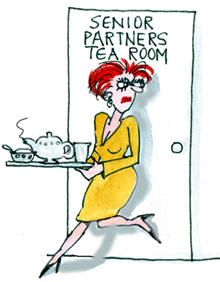Thoughts from a take home student
 Student-at-Large •
Student-at-Large •  Friday, June 16, 2017
Friday, June 16, 2017 The weird remoteness of law school learning ... The way in which students' skills are assessed is out of step with the real world ... Hannah Wootton, at the end of her law studies, wonders how it will all work in practice
 AS with the piles of reading, the amount of assessments at university is the bane of a law student's life. Yet, I am far from clear about the effectiveness of assessments in preparing students for a life in the law.
AS with the piles of reading, the amount of assessments at university is the bane of a law student's life. Yet, I am far from clear about the effectiveness of assessments in preparing students for a life in the law.
Assessments come in various shapes and forms: problem questions that seek to reflect real life scenarios; essays that probe for an understanding of how law and policy develop; or exams that account for between 50 and 70 percent of the grades for most core subjects.
Like most law students, I have become a pro at writing notes, smashing out essay answers in under an hour, and utilising reading time to its full potential.
However, I do not see how this will assist in what I anticipate will be a glittering legal career.
Exams do not reflect the varied situations students will encounter in professional life. The intense cramming, the requirement to spew out masses of knowledge in a few hours, the silent and anxiety-inducing exam halls - all are remote from the real world.
My friends and I have had moments in exams where we haven't been able to think straight, and buckled under the strain. While this pressure cooker existence is not unique to law school, at least in real life you are not entirely on your own - you can ask someone for advice or take a walk.
Take-home exams are a different kettle of fish - giving you time to research and draft responses, more closely resembling professional life outside the confines of university.
In the workplace, this is what fresh faced lawyers are likely to be doing. We won't be arriving at conclusions based on one legal principle pulled from a textbook. Rather, we will be using the full range of our legal research skills to give the smartest response to the issue at hand.
I've asked teachers before why take-home exams are not utilised more. While admitting they're a superior form of assessment to regular exams, they also point to plagiarism and collusion as reasons they're not more in vogue.
Yet, this is an issue with regular exams as well - owing to the strength of the online notes market the material relied on by students in exams is often not their own, so their knowledge has been acquired by cribbing not by original, first-hand means.
Stringent time limits on take-home exams can help resolve concerns about collusion. I've done take-homes that have to be completed within 24 hours, leaving no time for collusion - even if I'd wanted to collude.
Creative assessment formats can help increase practical skills in preparation for the workplace, should lecturers choose to explore them. The most useful assessment I've done at law school was a mid-semester assignment for land law.
First, it tested our independent research skills. The problem question we had to answer was not based on law we had covered in class, but rather required a combination of research and understanding of the basic tenets of property law.
This seemed relevant considering that a lot of law applied professionally would involve things that were never touched on at uni.
Secondly, we had the option of presenting our answer in oral format. One-on-one with our teacher, we answered questions on the problem just like a proper little lawyer would.
Similarly, assignments structured as client letters, advice memorandums and mitigation papers all have useful practical elements. Many of my fellow students are tormented by the belief that, come graduation, we will have some knowledge of the law, but no idea how to make it function.
While it is obviously no substitute for experience, learning how to do these practical things while undergraduates would be rather reassuring. I just wish the assessment formats were not just all about spouting knowledge crammed for the moment, but allowed us to research and think.
 Examinations,
Examinations,  Law school
Law school 









Reader Comments